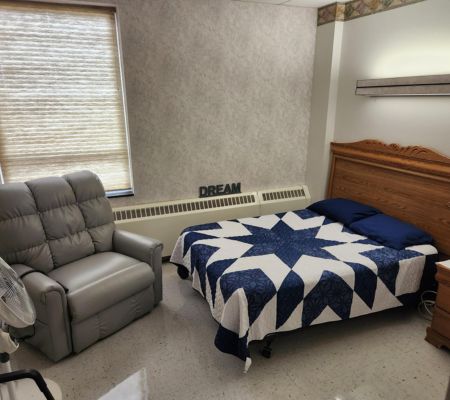
sleep lab bed and recliner
Sleep Lab / EEG Testing
For questions, please contact
Cindy Marshall, RPSGT, RST, EEGT
Primary Clinician- Sleep Lab
(719) 383-6316
cmarshall@avrmc.org
Sleep EEG Brochure
Sleep Lab In-house and Home Sleep Study options available
A sleep study, formally known as a polysomnogram (pronounced “poly-som-no-gram”), is a diagnostic test that tracks and records how multiple body systems work while you’re asleep. This test involves sensors that track the activity of multiple body systems, including your heart, brain and respiratory system, giving healthcare providers a comprehensive view of the quality of your sleep.
Healthcare providers use sleep studies to diagnose or rule out health issues. Healthcare providers usually recommend this test when you have symptoms of conditions that affect sleep, to determine how to treat those conditions or to see if completed treatments worked. These are generally conditions that affect or disrupt your brain, nervous system, breathing and heart function.
These studies can be performed on children through senior citizens. Your testing will be performed and interpreted by staff and physicians with credentials that are registered and recognized nationally.
Conditions that a sleep study can diagnose include:
●Abnormal Movements/Behaviors During Sleep
●Chronic Insomnia
●Excessive Sleepiness
●Multiple Sleep Latency Testing (MSLT)
●Narcolepsy
●Night Terrors
●Nocturnal Seizures
●Rapid Eye Movement (REM) Sleep Behavior Disorder
●Sleep Apnea / Severe Snoring
Sleep Schedule Disorders
Our lab is able to initiate Continuous Positive Airway Pressure (CPAP), Bilevel Positive Airway Pressure (BiPAP) and/or Oxygen as clinically indicated
Electroencephalography (EEG) Inpatient and Outpatient Testing Available
An EEG is a test that measures electrical activity in the brain. The test uses small, metal discs called electrodes that attach to the scalp. Brain cells communicate via electrical impulses, and this activity shows up as wavy lines on the EEG recording. Brain cells are active all the time, even while sleeping.
An EEG is one of the main tests to help diagnose epilepsy. An EEG also can play a role in diagnosing other brain conditions. EEG can find changes in brain activity that might aid in diagnosing brain conditions, especially epilepsy or another seizure condition. An EEG also might be helpful for diagnosing or treating the following:
●Brain tumors.
●Brain damage from a head injury.
●Brain disease can have a variety of causes, known as encephalopathy.
●Inflammation of the brain, such as herpes encephalitis.
●Stroke.
●Various sleep conditions.
●Brain death in someone in a coma.
This testing can be done for kids as well as adults. Your testing will be performed and interpreted by staff and physicians with credentials that are registered and recognized nationally.

